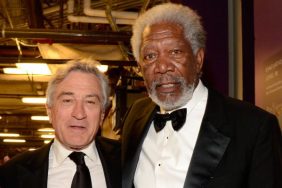Ralph Fiennes directorial debut was Coriolanus, a ferocious Shakespeare adaptation and a gritty modern day action movie. The Invisible Woman is more like the movie I’d expect Ralph Fiennes to direct. It’s a costume drama about the final days of celebrated British author Charles Dickens. Of course the acclaimed star of Schindler’s List, The English Patient and Quiz Show would do a period piece, because accents and history and Oscars and I’m the media.
In The Invisible Woman, Dickens (Fiennes) is already famous and goes around doing readings and leading performances of his work. When he falls in love with Nelly (Felicity Jones), he first tries to keep it a secret from his wife but ultimately goes for divorce, saddling Nelly with homewrecker status. Then he writes something about impressing a girl with wealth.
What sets The Invisible Woman apart from other biographies of artists, to me, is that Dickens seems like a really affable guy. He’s very popular, fun to be around, and seems to cheer up everyone who’s invited to the party. That’s quite a contrast from the usual movie where it turns out our favorite artist was really an A-hole who abused everyone around him. They’re all confined to the actual truth about the artists they’re portraying, but Dickens stands out from the others.
It’s also a refreshingly leisurely movie. For about the first hour, I literally didn’t know what the story of the movie was going to be. The elements were there but it wasn’t focusing on the romance between Dickens and Nelly, the troubles in Dickens’ marriage or even the extent of Dickens’ celebrity. It was sort of a portrait about the fun side of Victorian life, also a genre where we’ve seen a lot of plight and classism. Here it’s fun, and honest about some of the shortcomings of personalities like Dickens’, but more of a slice of life than the usual “this is history” costume drama.
The Invisible Woman does settle into the story as history would have us know, where Nelly is frustrated by her love of Dickens, who wants to love her back but man, he puts her in some unflattering situations. Visible or not, Nelly is always going to come second (or worse) to Dickens’ work and fame. Maybe Dickens was the original workaholic.
Both Fiennes and Jones are excellent here. Fiennes is so infectious with charm, it’s easy to see why someone would love him and forgive all the rules he comes with. Jones is a human woman of the era, displaying the love and life that we can still relate to today, along with the trappings of history’s expectations of women.
The tidbits about Great Expectations are subtle and interesting. It’s funny that I had just interviewed Mike Newell about his film adaptation, and we spoke about Dickens’ original ending which is addressed in The Invisible Woman. So, spoiler alert, but I can now vouch for the film’s authenticity and its dramatic illustration of why he changed it.
As actor/directors go, Fiennes has made a distinctive impression on me. So far he’s tackled traditional material; even modernizing Shakespeare is now a traditionally accepted approach. I’ll be interested to see where else he wants to go with this side of his career. Just as his acting work has spanned period pieces, edgy independent movies, modern day or sci-fi action and big studio extravaganzas, I’ll be on the lookout for his approach to whatever subject he selects.

Fred Topel is a staff writer at CraveOnline and the man behind Best Episode Ever and Shelf Space Weekly. Follow him on Twitter at @FredTopel.








